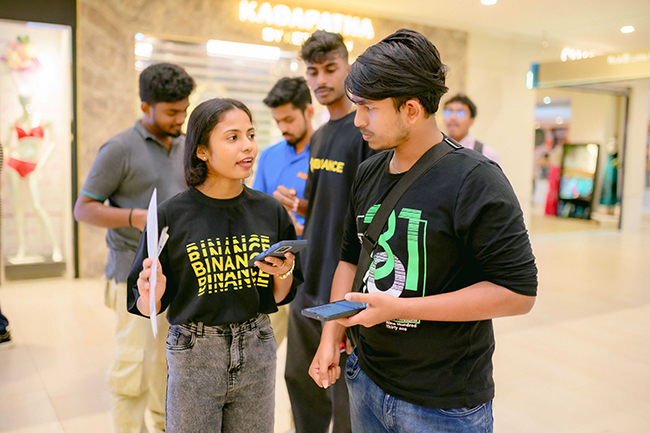Business
Expolanka Holdings demonstrates resilience in Q3 FY24, navigates challenging macroeconomic conditions

Expolanka Holdings PLC announced its financial results for the third quarter ending 31 December 2023, delivering a resilient performance, and leveraging its strengths despite global economic headwinds and uncertainty.
The Group reported a Revenue of Rs. 66.8 billion for the quarter and Rs. 183.9 billion for the nine months ending 31 December 2023. Gross Profit stood at Rs. 10.9 billion for the quarter, summing up to Rs. 34.2 billion for the nine-month period. A Net Loss of Rs. 5.1 billion was recorded for the quarter, contributing to a nine-month Net Loss of Rs. 12.3 billion.
Global trade faced challenges due to tightening monetary policies, high inflation, geopolitical tensions, trade protectionism, and elevated energy prices. These factors contributed to uncertainty, reduced consumer spending, and lower demand conditions.
Despite subdued global trade and fluctuating freight rates, Expolanka’s Logistics sector sustained its customer base and welcomed new clients, ending the quarter with Rs. 64.4 billion in Revenue and a Gross Profit of Rs. 10.2 billion. The sector experienced a Net Loss of Rs. 5.2 billion for the quarter. The sector also reported a revenue of Rs. 177 billion, a Gross Profit of Rs 32.1 billion and a Net Loss of Rs. 12.7 billion for the nine months of the financial year.
A drop in volumes and a steep decline in freight rates have impacted Revenue and Gross Profit, resulting in Operating Losses. Margins faced pressure due to declining freight rates and volumes. Profitability decline was visible across both Air and Ocean Freight and was more pronounced in the latter due to experiencing visible freight rate corrections during the year.
The Group reported that strategic investments to enhance domestic capabilities and recent international acquisitions namely, Trans American Global and the LEI Group, have performed to satisfaction whilst integration efforts have moved forward gradually.
With the company’s primary focus on strengthening customer relationships, EFL was able to retain all its core customers whilst witnessing growth in new customers. The strategy of enhancing service offerings and domestic logistics capabilities have had a positive impact both commercially and financially, establishing the group’s long-term vision as a global logistics company.
Additionally, EFL was able to leverage its strong network presence, market know-how, infrastructure capabilities and its experienced leadership team to bring to bear the exceptional value-added service offering to its customers. However, cost control initiatives are underway to improve profitability going forward while the recent acquisitions position the company well for long term growth.
The Leisure sector delivered strong results with Rs. 1 billion Revenue, a Gross Profit of Rs. 655 million and a Profit-After-Tax of Rs. 200.4 million. Robust corporate travel sales and recovering inbound and leisure travel segments boosted performance. Efficient operations and service excellence remain key success factors for the organization.
The Investment sector reported a steady quarter with Rs. 1.3 billion in Revenue and a Gross Profit of Rs. 33.8 million, reflecting stabilization in export operations and gradual progress in the IT business.
Prudent cash flow management and a low geared capital structure provided Expolanka the stability and flexibility to ride out external shocks, service debt and fund future expansion plans. Reinforced efficient working capital management has enabled the settlement of Rs. 10.02 billion in debt over the nine-month period. Working capital efficiencies also helped drive down finance costs and channel funds into growing operations. The focus on minimising finance costs has allowed for reinvestment into operations, maintaining a low-geared capital structure.
The company remains committed to long term investments across infrastructure, systems, and capabilities to actively strengthen its competitive positioning while driving improvements in operational and financial performance.
Committed to sustainability, the organization continues to prioritize Environmental, Social, and Governance (ESG) initiatives. Under its Global Goodness campaign, the Group has actively driven forward programs related to UN sustainability goals, green logistics, and support for women’s empowerment.
Despite the challenging macroeconomic environment, Expolanka Holdings remains agile to reducing challenges. The company is committed to its focus on business growth, efficiency improvement, and liquidity enhancement. Long-term strategies include continued investments in capabilities, infrastructure, and systems to navigate the evolving global business environment.
Business
Binance signals a maturing Crypto pitch in Sri Lanka

Frames crypto investing as a ‘measured journey rooted in knowledge and security’
In an industry often characterised by velocity, volatility and viral marketing, Binance’s latest community activation in Sri Lanka suggested a deliberate recalibration of its investor messaging.At its #BinanceHODLove event held at One Galle Face Mall, the world’s largest crypto exchange by trading volume chose a Valentine’s-themed slogan that stood out for its restraint: “Real Love Doesn’t Rush, Neither Should Crypto: A Valentine’s Message for Smart Investors.”
Behind the seasonal branding lies a more strategic theme – one that aligns with the crypto industry’s post-cycle shift toward compliance, literacy and risk awareness.
Sri Lanka’s retail investor base has demonstrated periodic interest in digital assets, particularly during phases of currency pressure and global crypto rallies. Yet market participation has also exposed gaps in financial literacy and susceptibility to high-yield promises.
Binance’s messaging at the event leaned heavily into investor caution. Participants were reminded to scrutinise unsolicited offers, avoid guarantees of quick returns, and protect sensitive information such as private keys and passwords. In a market where informal crypto schemes have occasionally surfaced, such emphasis reflects reputational risk management as much as community engagement.
The company also spotlighted Binance Academy, its educational platform, positioning knowledge acquisition as foundational to long-term participation in blockchain ecosystems.
While the event featured raffles and consumer electronics giveaways to drive footfall, the broader objective appeared to be brand consolidation at the grassroots level. Physical activations in high-traffic urban centres suggested a hybrid strategy: digital scale complemented by localised trust-building.
For a global exchange operating in increasingly scrutinised regulatory environments, nurturing responsible retail participation is both a defensive and expansionary move. By framing crypto investing as a “measured journey rooted in knowledge and security,” Binance is aligning itself with the industry’s pivot toward sustainability rather than speculative exuberance.
The subtext of the campaign was clear: growth in emerging markets like Sri Lanka will depend less on price momentum and more on credibility.
Binance’s Valentine’s message, therefore, may be less about romance and more about risk calibration. In that sense, the slogan captured a broader industry truth: endurance, not impulse, will define the next phase of digital asset adoption.
By Sanath Nanayakkare
Business
Unlisted tax jitters frizzle CSE rally; analysts flag spillover fears

Morning gains on the Colombo Stock Exchange (CSE) evaporated sharply in afternoon trade yesterday, as a wave of nervous selling swept through the market triggered by speculation that the government is mooting a fresh 10-15 percent tax on unlisted corporates. Although the proposed levy is currently targeted at entities outside the CSE purview, market participants grew wary that the measure could signal a broader shift in fiscal policy, stoking fears of future tax hikes that may eventually engulf listed companies and dent corporate earnings.
Amid those developments, the turnover was capped at a mere Rs 369 million despite fourteen crossings.
The top seven crossings mainly contributed to the turnover were Commercial Bank 1.60 million shares crossed to the tune of Rs 359.7 million and its share price traded at Rs 223, Renuka Foods 2.7 million shares crossed to the tune of Rs 179.6 million and its share price traded at Rs 63.50, LOLC Holdings 300,000 shares crossed to the tune of Rs 171.9 million and its share price traded at Rs 573, Sampath Bank 821,000 shares crossed to the tune of Rs 132 million and its share price traded at Rs 161, Commercial Bank (Non-Voting) 484,000 shares crossed to the tune of Rs 98.9 million and its share price traded at Rs 204, Sierra Cables two million shares crossed to the tune of Rs 69.6 million and its share price traded at Rs 34.80 and Citizens Developments Business Bank (Non-Voting) 200,000 shares crossed to the tune of Rs 62.9 million and its share price traded at Rs 324.
In the retail market top seven companies that have mainly contributed to the turnover were Renuka Agri Rs 1.14 billion (82.4 million shares traded), Softlogic Finance Rs 653.9 million (115 million shares traded), Sampath Bank Rs 270.8 million (1.65 million shares traded), Softlogic Capital Rs 230 million (19.3 million shares traded), JKH Rs 201 million (nine million shares traded) ,LOLC Holdings Rs 171.9 million (297,000 shares traded) and LMF Rs 171 million (1.8 million shares traded). During the day 369 million shares volumes changed hands in 39059 transactions.
It is said that banking and agriculture related companies performed well. In the banking sector Sampath Bank and Commercial Bank performed well. Further manufacturing sector especially JKH also significantly active in the market.
By Hiran H Senewiratne
Business
ComBank loan book grows by Rs. 541bn to top Rs. 2tn

The Commercial Bank of Ceylon achieved another performance milestone in 2025, becoming the first private sector bank in the country to expand its loan book beyond Rs. 2 Tn., with a growth of Rs. 541 Bn. over 12 months at a monthly average of over Rs. 45 Bn., demonstrating its commitment to national economic resurgence.
Recording the highest annual loan growth in absolute terms in the history of the institution, the Bank said gross loans and advances for the year ending 31st December 2025 grew by 36.37% to Rs. 2.028 Tn., taking total assets to Rs. 3.258 Tn. This reflected an increase of Rs. 468 Bn. or 16.78% and demonstrated more than double the growth recorded in 2024. The Bank’s net assets value per share improved to Rs. 198.30 from Rs. 170.94 at end 2024.
Deposits grew by 16.65% or Rs. 372 Bn. over the 12 months to end the year at Rs. 2.6 Tn., reflecting an average deposit growth of over Rs. 30 Bn. per month despite relatively lower interest rates, the Bank said. The CASA ratio of the Bank, which is considered to be the industry’s best, stood at 39.65% from 38.07% as at 31st December 2024.
Sharhan Muhseen, Chairman of Commercial Bank said: “We remain focused on the fundamentals that sustain shareholder value: earnings resilience, balance sheet strength, disciplined risk management and a strategy that is responsive to evolving customer and market needs. Our 2025 performance affirms the value of that focus.”
Sanath Manatunge, Managing Director/CEO of Commercial Bank said: “In 2025, we proved that scale and discipline can move together, growing lending and accelerating digital activity while strengthening asset quality and balance sheet resilience.”
In a filing with the Colombo Stock Exchange (CSE) the Bank said it recorded gross income of Rs. 354.81 Bn. for the year ending 31st December 2025 reflecting growth of 13.70% over the normalised figure for 2024, after adjusting for the impacts of restructuring of Sri Lanka International Sovereign Bonds (SLISBs) accommodated in that year, in order to avoid potential distortion of growth figures. Net gains / (losses) from derecognition of financial assets in the Income Statement for 2024 (as reported) included a derecognition loss on restructuring of SLISBs amounting to Rs. 45.108 Bn.
-

 Features6 days ago
Features6 days agoWhy does the state threaten Its people with yet another anti-terror law?
-

 Features6 days ago
Features6 days agoReconciliation, Mood of the Nation and the NPP Government
-

 Features6 days ago
Features6 days agoVictor Melder turns 90: Railwayman and bibliophile extraordinary
-

 Features5 days ago
Features5 days agoLOVEABLE BUT LETHAL: When four-legged stars remind us of a silent killer
-

 Features6 days ago
Features6 days agoVictor, the Friend of the Foreign Press
-

 Business5 days ago
Business5 days agoSeeing is believing – the silent scale behind SriLankan’s ground operation
-

 Business5 days ago
Business5 days agoBathiya & Santhush make a strategic bet on Colombo
-

 Features6 days ago
Features6 days agoBarking up the wrong tree























